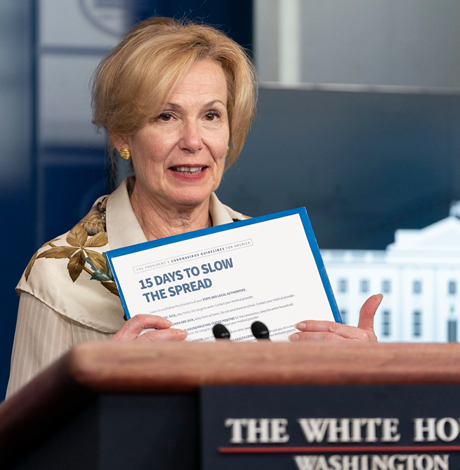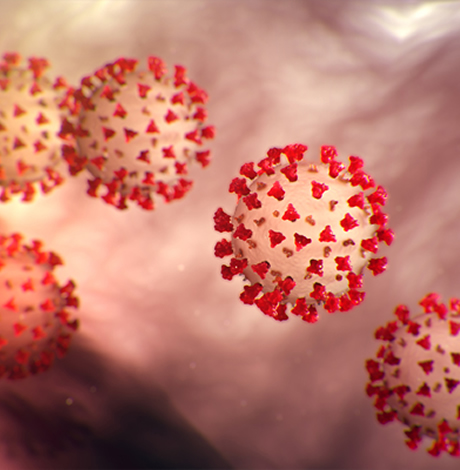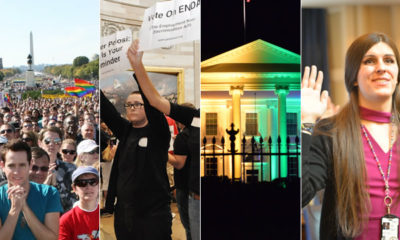Arts & Entertainment
Welcoming the world
Activists, filmmakers prepare for Int’l AIDS Conference with busy lineup of local events
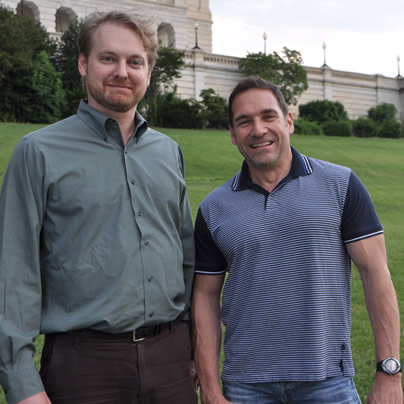
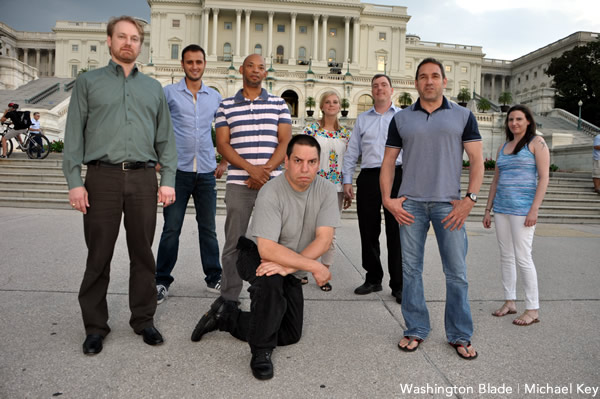
Members of the World AIDS Institute team (l-r): Chad Johnson, Diego Alves, Noel Short, David Miller, Angela Kelly, Kevin Maloney, Dave Purdy and Mariel Selbovitz. (Washington Blade photo by Michael Key)
As Washington gears up to host the International AIDS Conference for the first time in 22 years, local organizations have planned a bounty of free or independent events for those who could not afford the $150-$1,045 registration fee.
Global Village, an international organization that brings together leaders, researchers and performers from all over the world to increase awareness of HIV/AIDS, is hosting several sessions within the conference ranging from video screenings and art exhibitions to networking zones and meeting rooms. Everything the Global Village is hosting is free and open to delegates and locals.
“We are trying to connect science, research and community,” coordinator Joseph Elias says. “It is important that the D.C. community participates to get a grasp of what is happening locally and globally.”
Several of the events will be geared toward youth under the age of 30 dealing with HIV/AIDS.
Emily Carson, youth program coordinator at Global Village, says the focus on youth has been in demand.
“Young people are disproportionally affected by HIV,” she says. “In the conference in 2000, there were only 50 young people, and they said this is a severe problem, no one is speaking for us.”
Among the many attractions in the Global Village area, there will be an interactive story telling booth called, “Generations HIV.” The booth looks like a photo booth, but it records video instead.
The booth was created by Marc Smolowitz and Jörg Fockele, both San Francisco-based filmmakers, as part of their HIV Story Project. The booth has been featured three times in the San Francisco Bay area and has so far collected about 250 clips. The HIV Story Project is a non-profit organization that compiles multi-platform story telling and short films about living with HIV/AIDS.
“The booth is a conversation starter,” Smolowitz says. “It is to connect different generations of people living with HIV. You can ask questions of different generations, answer questions or record your personal story.”
Smolowitz and Fockele are currently trying to start an archive online where all the videos will be posted.
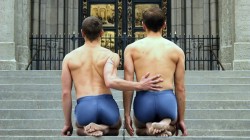
A still from ‘Ours,’ one of the films being screened July 24-25 in the AIDS Film Festival. (Image courtesy the Festival)
Along with the booth, the HIV Story Project team also has a movie screening at the International AIDS Film Festival, which is occurring in conjunction with the conference from July 24-25. The film is titled, “Still Around,” and is a compilation of 15 short films portraying different people living with HIV/AIDS in the San Francisco area. The people were paired with 16 different directors and had direct say in their own films. The films vary, and include stories about how people are thriving with the disease. One subject is a man who copes with his HIV-positive status through a hooking ritual. Another is a couple that marries, has a daughter and faces HIV/AIDS together.
Fockele says the film is an update of what the face of HIV/AIDS looks like in the U.S. and in Europe today.
“In Europe and the U.S. there are mostly historic films about HIV and AIDS,” he says. “What we went out to do is to get a film that is right here, right now.”
The movie is opening the festival on July 24 at 7 p.m. Tickets are $10, and a pass for all four films is $25. For more information about the International AIDS Film Festival 2012, visit internationalaidsfilmfestival.org.
The film festival and several other community events are a part of the AIDS2012 Reunion, a resource for conference attendees to see what local events are taking place outside the main conference.
“The one thing we are doing is we are allowing anyone to participate,” managing director David Purdy says. “Low-income people are one group that needs support and to get educated about HIV/AIDS.”
Some of the events in the AIDS2012 Reunion as well as other community events include:
• On July 20-21, the DC Center, National Coalition of LGBT Health, Whitman-Walker Health and Us Helping Us at George Washington University (2029 G St., N.W.) are hosting the Gay Men’s Health Summit. Registration is $85, $65 for students.
• On July 21, Jay Brannan is playing at the U Street Music Hall (1115A U St., N.W.) at 7 p.m. Tickets are $20.
• From July 21-27, the Textile Museum (2320 S St., N.W.) is showing a special display of one panel from the AIDS Quilt. An $8 donation is suggested.
• On July 22, there’s a March on Washington involving several different local organizations from noon to 2 p.m.
• On July 19 and 23, Arena Stage (1101 6th St., S.W.) hosts a benefit performance of its current production, the Larry Kramer-penned AIDS classic “The Normal Heart” at 8 p.m. Tickets are $65.
• On July 24, “Return to Lisner: A Forum on the State of HIV/AIDS,” is taking place at the Lisner Auditorium at George Washington University (2029 G St., N.W.). Registration is required.
For more events, visit the AIDS2012 Reunion website aids2012reunion.org.
These events are only a fraction of what will be occurring throughout the D.C. Metropolitan area.
Chris Dyer, organizer for the Gay Men’s Health Summit, says by hosting separate events from the conference, organizations can make them more focused on certain groups.
“Gay men’s health issues are unique,” he says. “The main conference deals with a variety of issues, but we are providing a safe place for gay, bisexual or trans men to talk about their specific issues in a safe place.”
Purdy also says that organizations like AIDS2012 Reunion bring the focus back to what is happening locally and connecting people to services they may not be aware of.
“We’re providing an opportunity to participate and win this war against AIDS,” he says.
Bringing the spotlight back to Washington, local filmmakers Art Jones and Pam Bailey are also presenting their documentary “13 Percent,” which is about how the African-American population in Washington and other metropolitan areas has been affected by HIV/AIDS in the past 10 years. The movie will be screening at Bloombars (3222 11th St., N.W.) on July 24 at 7 p.m. RSVP and $10 donation is suggested.
The film is intermixed with interviews from medical professionals, political leaders, religious leaders and those living with the virus. They showcase a variety of people affected by the disease and their stories, one of the most compelling being a young woman named Raven.
Raven was born with HIV and when her mother informed the Catholic school she was attending, Raven began facing daily discrimination from teachers and students. She describes how one teacher put garbage bags around her and would bar her from going on class trips. All of this occurred well after it was known how the virus is spread.
“I am hoping [the audience] take away the recognition that we are a community that is really threatened,” Jones says. “This film should be a call to action.”
He hopes this would lead to more exposure of how much of a threat HIV remains.
Purdy wishes similar things for attendees of the conference and the different community events.
“Really, I hope people have a new commitment or a recommitment to work together in this fight,” he says. “I would like them to share stories and remember the 30 million who have died from AIDS worldwide. There is a lot of work that needs to be done.”
Sports
Bisexual former umpire sues Major League Baseball for sexual harassment
Brandon Cooper claims female colleague sexually harassed him

A fired former umpire is suing Major League Baseball, claiming he was sexually harassed by a female umpire and discriminated against because of his gender and his sexual orientation.
Brandon Cooper worked in the minor league Arizona Complex League last year, and according to the lawsuit he filed Wednesday in federal court in Manhattan, he identifies as bisexual.
“I wanted my umpiring and ability to speak for itself and not to be labeled as ‘Brandon Cooper the bisexual umpire,’” he told Outsports. “I didn’t want to be labeled as something. It has been a passion of mine to simply make it to the Major Leagues.”
But that didn’t happen. Instead of being promoted, he was fired. His suit names MLB and an affiliated entity, PDL Blue, Inc., and alleges he had endured a hostile work environment and wrongful termination and/or retaliation because of gender and sexual orientation under New York State and New York City law.
“Historically the MLB has had a homogenous roster of umpires working in both the minor and major leagues,” Cooper claims in his suit. “Specifically, to date there has never been a woman who has worked in a (regular) season game played in the majors, and most umpires are still Caucasian men. To try to fix its gender and racial diversity issue, defendants have implemented an illegal diversity quota requiring that women be promoted regardless of merit.”
Cooper claims former umpire Ed Rapuano, now an umpire evaluator, and Darren Spagnardi, an umpire development supervisor, told him in January 2023 that MLB had a hiring quota, requiring that at least two women be among 10 new hires.
According to the suit, Cooper was assigned to spring training last year and was notified by the senior manager of umpire administration, Dusty Dellinger, that even though he received a high rating in June from former big league umpire Jim Reynolds, now an umpire supervisor, that women and minority candidates had to be hired first.
Cooper claims that upon learning Cooper was bisexual, fellow umpire Gina Quartararo insulted him and fellow umpire Kevin Bruno by using homophobic slurs and crude remarks. At that time, Quartararo and Cooper worked on the same umpiring crew and being evaluated for possible promotion to the big leagues.
This season, Quartararo is working as an umpire in the Florida State League, one of nine women who are working as minor league umpires.
Cooper said he notified Dellinger, but instead of taking action against Quartararo, he said MLB ordered Cooper to undergo sensitivity training. According to his lawsuit, he was also accused of violating the minor league anti-discrimination and harassment policy.
Cooper’s suit says he met with MLB Senior Vice President of Diversity, Equity and Inclusion Billy Bean — who the Los Angeles Blade reported in December is battling cancer.
The lawsuit says at that meeting, Bean told the umpire that Quartararo claimed she was the victim, as the only female umpire in the ACL. Cooper said he told Bean Quartararo regularly used homophobic slurs and at one point physically shoved him. He also claims that he has video evidence, texts and emails to prove his claim.
But he said his complaints to Major League Baseball officials were ignored. His lawsuit said MLB passed him over for the playoffs and fired him in October. He said of the 26 umpires hired with Cooper, he was the only one let go.
Through a spokesperson, MLB declined to comment on pending litigation. Quartararo has also not publicly commented on the lawsuit.
a&e features
Eastern Shore chef named James Beard Finalist
Harley Peet creates inventive food in an inclusive space

In a small Eastern Shore town filled with boutiques, galleries, and the occasional cry of waterfowl from the Chesapeake, Chef Harley Peet is most at home. In his Viennese-inflected, Maryland-sourced fine-dining destination Bas Rouge, Peet draws from his Northern Michigan upbringing, Culinary Institute of America education, and identity as a gay man, for inspiration.
And recently, Peet was named a James Beard Finalist for Best Chef: Mid-Atlantic – the first “Best Chef: Mid-Atlantic” finalist representing the Eastern Shore.
Peet, after graduation from the Culinary Institute of America, took a position as sous chef at Tilghman Island Inn, not far from Bas Rouge. Falling in love with the Eastern Shore, he continued his passion for racing sailboats, boating, gardening, and fishing, and living his somewhat pastoral life as he opened Bas Rouge in 2016 as head chef, a restaurant part of the Bluepoint Hospitality group, which runs more than a dozen concepts in and around Easton, Md.
Coming from a rural area and being gay, Peet knew he had his work cut out for him. He was always aware that the service and hospitality industry “can be down and dirty and rough.”
Now as a leader in the kitchen, he aims to “set a good example, and treat people how I want to be treated. I also want to make sure if you’re at our establishment, I’m the first to stand up and say something.”
The Bas Rouge cuisine, he says, is Contemporary European. “I’m inspired by old-world techniques of countries like Austria, Germany, and France, but I love putting a new spin on classic dishes and finding innovative ways to incorporate the bounty of local Chesapeake ingredients.”
His proudest dish: the humble-yet-elevated Wiener Schnitzel. “It is authentic to what one would expect to find in Vienna, down to the Lingonberries.” From his in-house bakery, Peet dries and grinds the housemade Kaiser-Semmel bread to use as the breadcrumbs.
Peet works to support the LGBTQ community inside and outside of the kitchen. “I love that our Bluepoint Hospitality team has created welcoming spaces where our patrons feel comfortable dining at each of our establishments. Our staff have a genuine respect for one another and work together free of judgment.”
Representing Bluepoint, Peet has participated in events like Chefs for Equality with the Human Rights Campaign, advocating for LGBTQ rights.
At Bas Rouge, Peet brings together his passion for inclusion steeped in a sustainability ethic. He sees environmental stewardship as a way of life. Peet and his husband have lived and worked on their own organic farm for several years. Through research in Europe, he learned about international marine sourcing. Witnessing the impacts of overfishing, Peet considers his own role in promoting eco-friendly practices at Bas Rouge. To that end, he ensures responsible sourcing commitments through his purveyors, relationships that have helped create significant change in how people dine in Easton.
“I have built great relationships in the community and there’s nothing better than one of our long-standing purveyors stopping in with a cooler of fresh fish from the Chesapeake Bay. This goes especially for catching and plating the invasive blue catfish species, which helps control the species’ threat to the local ecosystem.
Through his kitchen exploits, Peet expressed a unique connection to another gay icon in a rural fine-dining restaurant: Patrick O’Connell, of three Michelin starred Inn at Little Washington. In fact, Peet’s husband helped design some of O’Connell’s kitchen spaces. They’ve both been able to navigate treacherous restaurant-industry waters, and have come out triumphant and celebrated. Of O’Connell, Peet says that he “sees [his restaurants] as canvas, all artistry, he sees this as every night is a show.” But at the same time, his “judgment-free space makes him a role model.”
Being in Easton itself is not without challenges. Sourcing is a challenge, having to either fly or ship in ingredients, whereas urban restaurants have the benefit of trucking, he says. The small town “is romantic and charming,” but logistics are difficult – one of the reasons that Peet ensures his team is diverse, building in different viewpoints, and also “making things a hell of a lot more fun.”
Reflecting on challenges and finding (and creating) space on the Eastern Shore, Peet confirmed how important it was to surround himself with people who set a good example, and “if you don’t like the way something is going … move on.”

Team DC, the umbrella organization for LGBTQ-friendly sports teams and leagues in the D.C. area, held its annual Night of Champions Awards Gala on Saturday, April 20 at the Hilton National Mall. The organization gave out scholarships to area LGBTQ student athletes as well as awards to the Different Drummers, Kelly Laczko of Duplex Diner, Stacy Smith of the Edmund Burke School, Bryan Frank of Triout, JC Adams of DCG Basketball and the DC Gay Flag Football League.
(Washington Blade photos by Michael Key)



















-

 State Department3 days ago
State Department3 days agoState Department releases annual human rights report
-

 Maryland4 days ago
Maryland4 days agoJoe Vogel campaign holds ‘Big Gay Canvass Kickoff’
-

 Politics3 days ago
Politics3 days agoSmithsonian staff concerned about future of LGBTQ programming amid GOP scrutiny
-

 District of Columbia19 hours ago
District of Columbia19 hours agoCatching up with the asexuals and aromantics of D.C.

